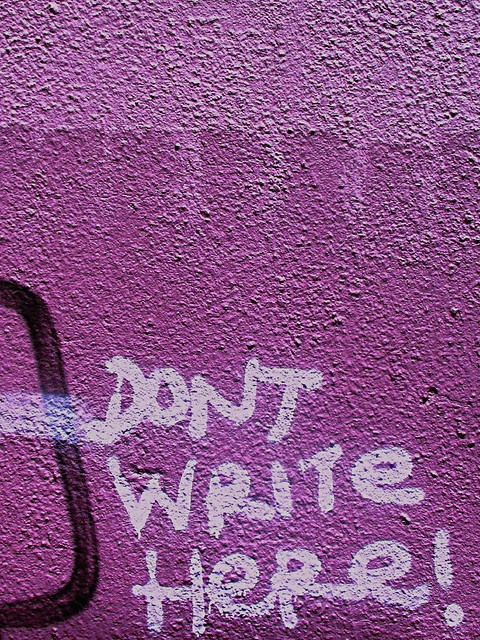Last week, the 85th anniversary of Nancy Drew
happened. The article details how Nancy became a role model to girls
living in the Great Depression, driving around in a car and wielding a
gun to deal with potentially dangerous criminals. Later editions turned
Nancy into a damsel in distress, needing a college boyfriend to save
her, but she inspired a generation of female readers.
I felt a sense of disconnect. The Nancy Drew that I knew was not the girl detective of my childhood. Sammy Keyes eventually became that,but another fictional lady came in between. She was a little older than me, wore fake glasses and ratty jeans to go out spying, and she wrote in a notebook. This was Harriet the Spy, from her titular novel by Louise Fitzhugh.
Image source: https://farm1.staticflickr.com/6/10922464_a04a3a97a3_z_d.jpg?zz=1
I shied from reading Harriet the Spy at first because of the title. The thought of reading about a girl that spied on others, including her friends, and wrote about it in her journal, did not appeal to me. I like reading about characters who are fundamentally good and who didn't get into trouble. My siblings kept checking out the book from the library, and I kept returning it.
Then one day, I cracked it open and started. I became captivated, and started reading. The book paints a picture of the 1960s, when children could wander the New York City streets without their parents worrying, and slip into dumbwaiters. Kid bullies could spill bottles of ink on their victims because ink bottles were part of the curriculum. Authors still use heavy typewriters, and can crinkle up their paper with poor handling. People could order egg creams -- a type of cream soda that I had never heard about before-- and sip them slowly. I had always pictured them as a drink to slurp from a bowl, but they apparently came from tall glasses.
Image source: https://farm5.staticflickr.com/4119/4809140778_c789c0b7de_z.jpg
More importantly, the story itself featured an imperfect yet likable protagonist that doesn't want to change when the world imposes changes upon her. Harriet loses a lot of valuable things, and people, and the path to winning them back or letting them go does not always have a straight answer. She represents brutal honesty in a world that does not appreciate hostile words, and thus suffers persecution. Even readers, like my brother who recommended the book, have little sympathy for Harriet and for the honest notes she writes in her notebook. The film adaptation makes Harriet's thoughts worse, so that her former friends have a more valid reason to bully her, though there never is a valid reason for bullying a child in my opinion.
Anne Lamott in Bird by Bird mentions how writers as children are told to ignore their instinct and accept little lies as opposed to swallowing and registering proper truths. One cannot create believable fiction without knowing how real life works, and how people behave, why they act the way that they think. People do and think horrible things, sometimes with good intentions. Sometimes their motivations are complex, but they do not behave in a vacuum. A writer, too involved in the art of crafting as I am, can miss all those actions and motivations and real life, perhaps because we cannot face the horrifying truth.
Image source: https://farm8.staticflickr.com/7398/10340268116_58fa280623_z_d.jpg
Harriet taught me that a character with stubbornness and brutal honesty can be likable, and she demonstrated a skill that all writers need: the ability to observe. This eleven-year old girl spies so that she can learn more about people, to put them in the books that she will write later. She faces the daily mundane horrors that plague humanity on a regular basis, whether they concern heiresses with too much money or birdcage makers with too many cats. Her problem lies in having no filter for her thoughts when they end up in her notebook, and when her notebook ends up in her friends' hands.
I had an epiphany after reading Harriet the Spy: I wanted to write, and to become a writer. My desire to create stories hadn't notified me; the fiction prompts in preparation for the FCAT hadn't notified me either. Yet I wanted to write, and to create worlds that would absorb readers the way older books had absorbed me.
Image source: https://farm4.staticflickr.com/3292/2908092283_2f7283a9f9_z_d.jpg?zz=1
Unlike my sudden desire to learn figure skating after reading the Boxcar Children, writing was a skill that I could hone on my own time, with just a piece of paper, or a blank notebook, and a pen. The computer could also help, with various writing programs and access to the Internet. I learned later how to connect with fellow writers using the web and to find soundtracks, but at the time computers only made me feel official, that I could write something that could be printed and look official.
There was a bit of a problem: I had the ideas, thanks to Harry Potter fanfiction and inspiration from fantasy authors, but I didn't have any idea how to structure a story, or what elements were involved. I didn't know how to use words to develop character. Worst of all, I didn't know how to write honestly, or how to observe people.
I withdraw from the real world, finding a structured fiction more appealing than the harsh realities of our time. "Write what you know" seemed to be a facetious piece of advice, since what a person knew was not necessarily what interested them. I didn't start incorporating personal experience into fiction until high school, and even then it took about four more years to learn that it was okay to do so, in fact encouraged.
Image source: https://farm2.staticflickr.com/1159/763255266_eae4a9aa27_z_d.jpg
Harriet knew better than I did about how to write, and how to record life without a filter. It gets her in trouble, but the book argues that writers need to be honest with themselves while lying to the people they know to avoid hurting people's feelings when you use real details. One can use filters, but only after the rough drafts are written.
I felt a sense of disconnect. The Nancy Drew that I knew was not the girl detective of my childhood. Sammy Keyes eventually became that,but another fictional lady came in between. She was a little older than me, wore fake glasses and ratty jeans to go out spying, and she wrote in a notebook. This was Harriet the Spy, from her titular novel by Louise Fitzhugh.
Image source: https://farm1.staticflickr.com/6/10922464_a04a3a97a3_z_d.jpg?zz=1
I shied from reading Harriet the Spy at first because of the title. The thought of reading about a girl that spied on others, including her friends, and wrote about it in her journal, did not appeal to me. I like reading about characters who are fundamentally good and who didn't get into trouble. My siblings kept checking out the book from the library, and I kept returning it.
Then one day, I cracked it open and started. I became captivated, and started reading. The book paints a picture of the 1960s, when children could wander the New York City streets without their parents worrying, and slip into dumbwaiters. Kid bullies could spill bottles of ink on their victims because ink bottles were part of the curriculum. Authors still use heavy typewriters, and can crinkle up their paper with poor handling. People could order egg creams -- a type of cream soda that I had never heard about before-- and sip them slowly. I had always pictured them as a drink to slurp from a bowl, but they apparently came from tall glasses.
 |
| This is what kids drank in the 1960s |
More importantly, the story itself featured an imperfect yet likable protagonist that doesn't want to change when the world imposes changes upon her. Harriet loses a lot of valuable things, and people, and the path to winning them back or letting them go does not always have a straight answer. She represents brutal honesty in a world that does not appreciate hostile words, and thus suffers persecution. Even readers, like my brother who recommended the book, have little sympathy for Harriet and for the honest notes she writes in her notebook. The film adaptation makes Harriet's thoughts worse, so that her former friends have a more valid reason to bully her, though there never is a valid reason for bullying a child in my opinion.
Anne Lamott in Bird by Bird mentions how writers as children are told to ignore their instinct and accept little lies as opposed to swallowing and registering proper truths. One cannot create believable fiction without knowing how real life works, and how people behave, why they act the way that they think. People do and think horrible things, sometimes with good intentions. Sometimes their motivations are complex, but they do not behave in a vacuum. A writer, too involved in the art of crafting as I am, can miss all those actions and motivations and real life, perhaps because we cannot face the horrifying truth.
Harriet taught me that a character with stubbornness and brutal honesty can be likable, and she demonstrated a skill that all writers need: the ability to observe. This eleven-year old girl spies so that she can learn more about people, to put them in the books that she will write later. She faces the daily mundane horrors that plague humanity on a regular basis, whether they concern heiresses with too much money or birdcage makers with too many cats. Her problem lies in having no filter for her thoughts when they end up in her notebook, and when her notebook ends up in her friends' hands.
I had an epiphany after reading Harriet the Spy: I wanted to write, and to become a writer. My desire to create stories hadn't notified me; the fiction prompts in preparation for the FCAT hadn't notified me either. Yet I wanted to write, and to create worlds that would absorb readers the way older books had absorbed me.
Image source: https://farm4.staticflickr.com/3292/2908092283_2f7283a9f9_z_d.jpg?zz=1
Unlike my sudden desire to learn figure skating after reading the Boxcar Children, writing was a skill that I could hone on my own time, with just a piece of paper, or a blank notebook, and a pen. The computer could also help, with various writing programs and access to the Internet. I learned later how to connect with fellow writers using the web and to find soundtracks, but at the time computers only made me feel official, that I could write something that could be printed and look official.
There was a bit of a problem: I had the ideas, thanks to Harry Potter fanfiction and inspiration from fantasy authors, but I didn't have any idea how to structure a story, or what elements were involved. I didn't know how to use words to develop character. Worst of all, I didn't know how to write honestly, or how to observe people.
I withdraw from the real world, finding a structured fiction more appealing than the harsh realities of our time. "Write what you know" seemed to be a facetious piece of advice, since what a person knew was not necessarily what interested them. I didn't start incorporating personal experience into fiction until high school, and even then it took about four more years to learn that it was okay to do so, in fact encouraged.
Image source: https://farm2.staticflickr.com/1159/763255266_eae4a9aa27_z_d.jpg
Harriet knew better than I did about how to write, and how to record life without a filter. It gets her in trouble, but the book argues that writers need to be honest with themselves while lying to the people they know to avoid hurting people's feelings when you use real details. One can use filters, but only after the rough drafts are written.




No comments:
Post a Comment